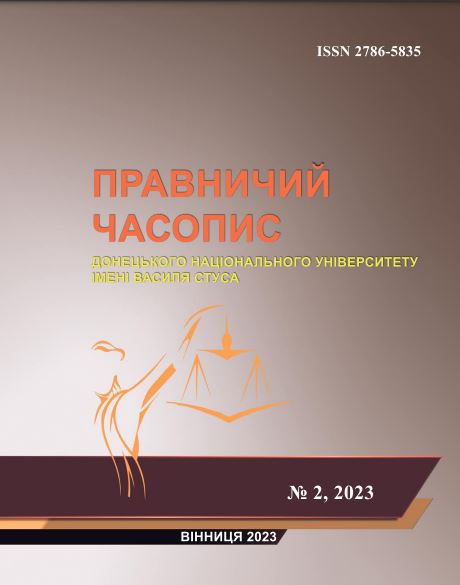Establishment and Development of the Legal Principle of Freedom in Classical Legal Theories
DOI:
https://doi.org/10.31558/2786-5835.2023.2.1Keywords:
freedom; legal principle; legal doctrine; Aristotle; Plato; Locke; Hobbes; Rousseau; Montesquieu; Kant; Hegel; Berlin; ConstantAbstract
The article analyzes the main legal doctrines starting from antiquity, which influenced the understanding of freedom in the legal life of society, its influence on the formation of social order. The position of Aristotle is studied, for whom the principle of freedom is primarily a question not of individual autonomy but of the form of government. B. Konstan confirms that the principle of freedom carries out its genesis and deployment from collective to individual levels. In ancient times, society was class-based, but class struggle did not yet exist, everyone occupied his place depending on the degree of freedom and property status.
The author analyzes the position according to which Medieval European legal consciousness makes the necessary semantic transition from state-wide to individual freedom through the concept of freedom of will. Here through the prism of free will the institution of legal responsibility and legal capacity is established, since right or wrong behavior is connected with a conscious choice. The theoreticians of the natural law doctrine for the first time consider freedom as a component of human nature which can take various forms from chaos, war of all against all to the natural primordial harmony of free people.
Hegel proves the important position that law is the sphere of generality, not individuality, its norms are a transition from the individual to the general. Individual freedoms can be agreed among themselves at the general level of legal norms.
The views of I. Berlin, who singles out "positive" and "negative" freedom, are studied. The first consists in the possibility of being one’s own owner that is of freely managing one’s own personality. This approach is close to the natural original freedom, but here it already places the principle of freedom in the modern field of civilization. Therefore there is freedom to do something, think, say, and there is freedom "from something", from external interference. It was this vision that led to the classification of rights into positive and negative.
The article substantiates the position that the legal principle of freedom unfolds in social reality as opportunities and independence. In the legal regulatory plane freedom is in constant search of its limits and the balance between possibilities and arbitrariness.
References
Арістотель. Політика / пер. з давньогр. та передм. О. Кислюка. Київ: Основи, 2000. 239 с.
Себайн Дж. Г., Торсон Т. Л. Історія політичної думки / пер. з англ. Київ: Основи, 1997. 838 с.
Констан Б. Про свободу древніх у її порівнянні зі свободою сучасних людей. Лібералізм: антологія упоряд. О. Проценко, В. Лісовий. Київ, 2002. С. 412 – 415.
Погребняк С. Генезис ідеї свободи як основоположного принципу права: Вісник Академії правових наук України. 2010. № 2. С. 7–17.
Гоббс Т. Левіафан: пер. з англ. Р. Димерець. Київ, Дух і літера. 2000. 600 с.
Augustine, Bishop of Hippo. [De libero arbitrio. English]. On free choice of the will / translated, with introduction and notes, by T. Williams. 1967. P. 354–430.
Thomas Aquinas. The Summa Theologiæ Second and Revised Edition, 1920 / translated by Fathers of the English Dominican Province. Online Edition Copyright 2017 by Kevin Knight, Nihil Obstat. F. Innocentius Apap, O.P., S.T.M., Censor. Theol. URL: https://www.newadvent.org/summa
Лок Дж. Два трактати про правління./пер. з англ. Павло Содомора. Київ: Наш Формат, 2020. 312 с.
Монтескье Ш. Л. Избранные произведения / общ. ред. и вступ. ст. М. П. Баскина. Москва: Гослитиздат, 1955. 463 с.
Руссо Ж.-Ж. Про суспільну угоду, або принципи політичного права / пер. з фр. та ком. О. Хома. Київ: Port-Royal, 2001. 349 с.
Кант И. Сочинения: в 6 т. Москва. Мысль, 1965. Т. 4. Ч. 1. 544 с.
Пилипишин П. Б. Розкриття сутності людини як стержень індивідуалістичної концепції у філософії права Імманнуїла Канта. Право і суспільство. 2021. № 1. С. 15–21.
Павлова Т. С. Сфера права як сфера свободи у філософії Гегеля. Ґілея. № 39. (2010). С. 264–269.
Констан Б. Про свободу древніх у її порівнянні зі свободою сучасних людей. Лібералізм: антологія / упор. О. Проценко, В. Лісовий. Київ: Смолоскип, 2002. С. 411–423.
Гедікова Н. П. Поняття свободи у соціально-філософському контексті. Наукове пізнання: методологія та технологія 2019. №2(43) С. 18-24.
Осядла М. В. Свобода як цінність права (теоретико-правовий аспект) : автореф. дис. ... канд. юрид. наук : 12.00.01. Київ, 2016. 202 с.

